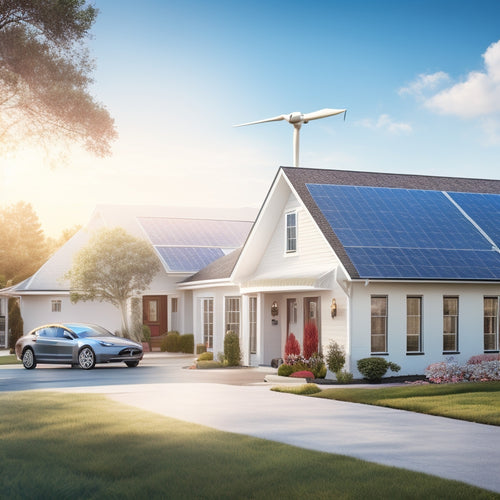
What Are the Most Cost-Effective Solar Panels for Homeowners
Share
You can install a cost-effective solar panel system for your home, with prices ranging from $2.50 to $3.50 per watt, depending on the panel efficiency and quality. Federal and state incentives can save you up to 30% of the total cost. Brands like Trina, Jinko, and Hanwha offer reliable performance at lower costs. Evaluating panel efficiency ratings and balancing efficiency with budget is essential for informed choices. By understanding material types, production techniques, and installation savings, you can make the most of your investment. To optimize your cost-effective solar panel system, investigate your options and consider the factors that matter most to you.
Key Takeaways
- Top brands like Trina, Jinko, and Hanwha offer reliable performance at lower costs, making them a cost-effective option for homeowners.
- Evaluating panel efficiency ratings (15%-22%) is crucial for informed choices, as it affects the cost-benefit analysis of solar panels.
- High-efficiency panels from budget brands provide competitive pricing, while community solar allows shared investment in solar arrays, reducing bills and carbon footprint.
- Installation savings can be achieved through efficient installation processes, bulk purchasing, and comparing installation companies for best pricing options.
- To maximize solar savings, homeowners should utilize federal and state tax credits, explore rebates, and engage in net metering programs to sell excess energy back to the grid.
Understanding Solar Panel Costs
Many homeowners interested in shifting to renewable energy are deterred by the upfront cost of solar panels. However, you don't have to let the initial investment hold you back.
Understanding solar panel costs is key to making an informed decision. The total cost of solar panels includes the system's hardware, installation, and maintenance. While the initial outlay may seem high, you can offset it with solar incentives like tax credits and rebates.
Financing options, such as loans or power purchase agreements, can also help spread the cost over time. Additionally, consider the long-term savings on your energy bills, which can add up to thousands of dollars over the system's lifetime.
Top Brands for Budget-Friendly Options
You're likely looking for solar panel brands that offer affordable options without compromising on quality.
Budget solar options from manufacturers like Trina and Canadian Solar provide reliable performance at a lower cost.
Budget Solar Options
Since you're looking to switch to solar power without breaking the bank, budget solar options are worth exploring.
You'll be happy to know that there are top brands offering affordable solutions without compromising on quality.
One such option is community solar, where you can share the benefits of solar energy with your neighbors. This model allows you to invest in a shared solar array, reducing your energy bills and carbon footprint.
Additionally, you can benefit from tax incentives, which can help offset the initial costs.
When it comes to budget-friendly solar panels, brands like Trina, Jinko, and Canadian Solar offer high-efficiency panels at competitive prices.
These brands have established themselves as reliable players in the industry, providing excellent performance and durability.
Affordable Panel Choices
When shopping for affordable solar panels, homeowners often find themselves evaluating the pros and cons of various brands. You want to verify you're getting the best value for your money while still reaping the benefits of solar energy.
Top brands like Trina, Jinko, and Hanwha offer budget-friendly options without compromising on quality. These panels are often manufactured in high volumes, reducing production costs and making them more affordable for you. You can expect to save around 10-20% compared to premium brands.
Additionally, look for installation discounts and solar tax incentives, which can further reduce the overall cost.
For instance, the Trina Tallmax M10 is a popular choice among homeowners, offering high efficiency at a lower price point. Jinko's Cheetah series is another option, providing reliable performance at an affordable rate.
Hanwha's Q CELLS series is also worth considering, with its high-efficiency cells and competitive pricing. By choosing these affordable panel options, you can enjoy the benefits of solar energy while staying within your budget.
Efficiency Vs. Affordability Tradeoffs
By now, homeowners considering solar panels have likely encountered the efficiency vs. affordability tradeoff. This dilemma arises because high-efficiency panels, which convert more sunlight into electricity, come at a higher cost. On the other hand, more affordable options may compromise on performance longevity. You'll need to weigh the benefits of each approach.
High-efficiency panels typically boast higher power outputs and longer warranties, ensuring better performance over their lifespan. However, they often require more advanced technology and premium materials, driving up installation expenses.
Conversely, more affordable options might've lower power outputs and shorter warranties, but they can still provide significant energy savings at a lower upfront cost.
When making your decision, consider your energy needs, budget, and long-term goals. If you prioritize maximizing energy production and are willing to invest in premium technology, high-efficiency panels might be the better choice.
However, if you're on a tighter budget and still want to reduce your carbon footprint, more affordable options can still provide a strong return on investment.
Factors Affecting Solar Panel Pricing
When you're shopping for solar panels, you'll notice that prices vary considerably depending on the panel's efficiency rating.
Higher-efficiency panels typically cost more because they're made with more expensive materials and have lower production costs per unit.
You'll need to weigh the benefits of higher efficiency against the added upfront cost, considering factors like your available roof space and energy needs.
Panel Efficiency Ratings
As you investigate the world of solar panels, you'll encounter various efficiency ratings that greatly impact the overall cost of your solar panel system. These ratings determine how well a panel converts sunlight into electricity, affecting your energy yield and overall panel performance.
A higher efficiency rating means more power output per unit area, resulting in a more compact system that requires less space. For instance, a 300-watt panel with a 20% efficiency rating will occupy less roof space than a 300-watt panel with a 15% efficiency rating. This is essential for homeowners with limited roof space or those seeking a more discreet installation.
When evaluating panel efficiency, look for ratings between 15% and 22%. While higher ratings are desirable, they often come at a higher cost.
Balance efficiency with your budget and energy needs to find the most cost-effective solution for your home. By understanding the impact of panel efficiency on your energy yield, you can make an informed decision that meets your unique requirements.
Material and Production Costs
You've likely contemplated the efficiency ratings of solar panels, but now it's time to examine the material and production costs that greatly impact the overall pricing of your solar panel system.
The type of material used in your solar panels affects their cost. For instance, monocrystalline silicon panels are more expensive than polycrystalline silicon panels due to the higher purity of silicon used. Thin-film panels, on the other hand, are cheaper to produce but less efficient.
The production techniques used also influence the final cost. Manufacturers that employ advanced production techniques, such as automation and precision engineering, can reduce labor costs and increase efficiency. This results in lower prices for homeowners.
Additionally, manufacturers that produce high volumes can negotiate better deals on raw materials, further reducing costs.
When evaluating solar panels, it's crucial to examine the material types and production techniques used to guarantee you get the best value for your money. By understanding these factors, you can make an informed decision and choose the most cost-effective solar panels for your home.
Best Value Solar Panels Today
Selecting the best value solar panels today involves balancing quality, efficiency, and cost. You want to guarantee you're getting high-performance panels that will maximize your energy savings without breaking the bank. To achieve this balance, take into account the following factors: module efficiency, warranty, and durability.
Look for panels with high module efficiency ratings, as they'll generate more power per hour of sunlight. An extensive warranty that covers both parts and labor will provide peace of mind and protect your investment. Durability is also essential, as it directly impacts the panel's lifespan and overall performance.
When evaluating solar panels, you'll also want to take into account the total installation cost. Take advantage of solar panel incentives, such as the federal solar investment tax credit (ITC), which can greatly reduce your upfront costs.
Additionally, look for installation companies that offer savings through efficient installation processes or bulk purchasing. By optimizing your solar panel selection and installation, you can enjoy considerable installation savings and maximize your return on investment.
Maximizing Your Solar Savings
Now that you've found the best value solar panels for your home, it's time to focus on maximizing your solar savings. You've made a smart investment, and with the right strategy, you can reap even more benefits.
One key way to maximize your savings is to take advantage of incentive programs. These can include federal and state tax credits, rebates, and other financial incentives that can greatly reduce the upfront cost of your solar panel system.
Additionally, many utility companies offer net metering programs, which allow you to sell excess energy back to the grid and offset your energy bills.
To further optimize your long-term savings, consider monitoring your energy usage and adjusting your consumption habits accordingly. By doing so, you can guarantee that you're getting the most out of your solar panel system and enjoying the highest possible return on investment.
Frequently Asked Questions
Can I Install Solar Panels Myself to Save Money?
You're considering a DIY installation to save money, but be aware that it requires significant skill and time. While it's possible, you'll need to weigh the cost savings against potential risks, warranty voidance, and compromised system performance, so it's crucial to carefully weigh the pros and cons.
Are Solar Panels Worth It for Small or Shaded Homes?
You're wondering if solar panels are worth it for your small or shaded home. While installation challenges may arise, optimizing solar efficiency with strategic panel placement can still make them a worthwhile investment, despite reduced energy output.
Do Solar Panels Increase My Home's Resale Value?
You're adding a gem to your crown, and that gem is a solar panel system, which not only sparkles with environmental benefits but also increases your home's resale value, making it a prized possession for potential buyers.
Can I Finance Solar Panels With a Home Equity Loan?
You can finance solar panels with a home equity loan, releasing loan benefits like low interest rates and flexible repayment terms, but your credit score will impact approval, and it is crucial to weigh financing options carefully.
Will Solar Panels Void My Roof's Warranty?
You'll want to review your roof's warranty terms, as solar panel installation might void it; however, many manufacturers accommodate roof warranty considerations, ensuring a hassle-free installation that preserves your roof's protection.
Conclusion
As you weigh your solar panel options, remember that cost-effectiveness is just the beginning. With the right combination of efficiency, quality, and pricing, you can capture the power of the sun to fuel your home - and your savings. Like the sun itself, the perfect solar panel system will illuminate your path to energy independence, casting a bright light on your wallet.
Related Posts
-

Why You Need a Phone Mount for Navigation
When you're on the road, a reliable phone mount is not just a convenience, it's a safety necessity that helps you mai...
-

Solar Panel System Certification Costs: A 10-Point Breakdown
You're looking to understand the costs associated with solar panel system certification. Your total certification cos...
-

Why Homeowners Are Embracing DIY Energy Independence
By taking control of your energy needs, you're breaking free from the uncertainty of utility bills and embracing a se...


